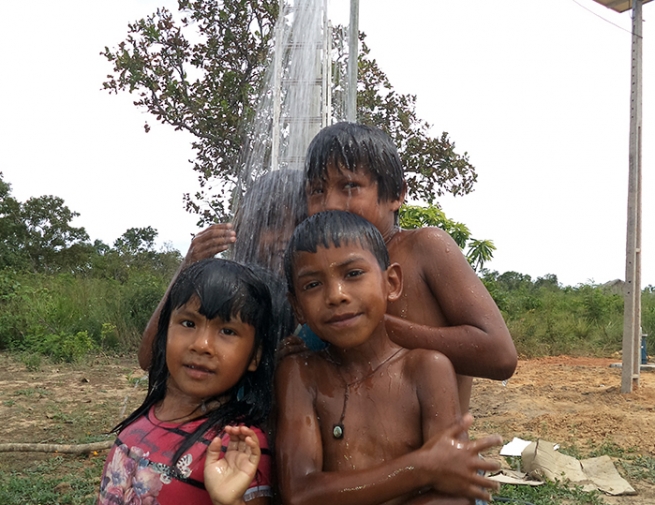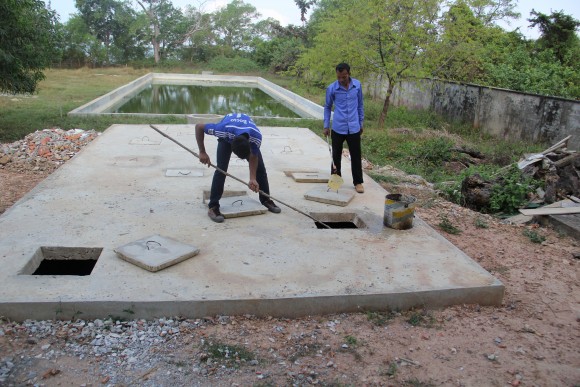BRAZIL: More than 250 Wells in Villages Built by Traveling Missionary Support Program

(MissionNewsire) The Traveling Missionary Support Program, an initiative by Salesian missionaries, has built more than 250 wells in Brazil in the last several years. The program, which is based in Mato Grosso, a large state in west-central Brazil largely covered with Amazon rainforest, wetlands and savanna plains, supports local communities and Salesian programs in the rural villages through machine maintenance, the construction and maintenance of hydropower plants, and most recently, has engaged in the construction of wells in areas that need a clean water supply.
The program supports the work of Salesian programs that focus on native populations especially the Xavantes and Bororo tribes. In early April, a team from the program including Salesian Brothers Ludwig Würstle and Mario Bordignon and technician Osmar Paulino Guarienti Bezerra drilled a well 30 meters deep and built hydraulic and electrical systems in the Bororo village of Jarudori near Poxoréu. The team also built another well the Bororo village of Areiao in Santo Antônio do Leverger, near the bank of the Arareiáo River. The team also installed a water tank, solar panels, a pump, and a fountain with a shower.
“Through this project, residents of the village are now able to drink unpolluted water instead of the water from the river which is polluted with pesticides from large soya, cotton and corn plantations” explained Bro. Würstle, the project coordinator.
The Traveling Missionary Support Program started in the 1970s, initially under the name of Motorized Help to Amazonia. At that time, military vehicles donated from Switzerland were used for the construction of roads and bridges to three missions served by the Salesian missionaries at Meruri, San Marcos and Sangradouro. Ten years later when the agreement with Switzerland ended, Salesian missionaries in Mato Grosso decided to continue the project with its own resources and help from donors from Germany, Italy, Spain, Switzerland, and the United States.
UN Water estimates that worldwide 768 million people lack access to improved water sources and 2.5 billion people have no improved sanitation. For those who have no access to clean water, water-related disease is common with more than 840,000 people dying each year from water-related diseases. Women and children often bear the primary responsibility for water collection in the majority of households and globally, spend 140 million hours a day collecting water. Children in these communities are forced to walk for hours to collect drinking water—water that often proves contaminated and seriously sickens those who consume it. Many others are unable to attend school regularly because they must spend time searching for distant wells.
“Having access to clean water is essential for life and brings a sense of dignity to the children and families we serve in our programs,” says Father Mark Hyde, executive director of Salesian Missions, the U.S. development arm of the Salesians of Don Bosco. “Improving water and sanitation facilities also ensures that teachers and students are working and learning in an environment that promotes proper hygiene and has safe drinking water, reducing the number of waterborne illnesses that can affect those in our schools keeping them away from important study time.”
Brazil has one of the strongest economies in Latin America and is an important agricultural and industrial power in the region. Just over 15 percent of Brazilians live in poverty, with the majority living in the rural northeast of the country, according to the World Bank. While Brazil is making positive changes, there are still large gaps between the poor and the rich and issues of income inequality and social exclusion remain at the root of those in poverty.
Inequalities also exist in access to education and educational efficiency. These inequalities are greatest for children and youth who are poor, live in rural areas or who have an incomplete compulsory education. Salesians working with poor youth and their families in Brazil develop programs and provide youth opportunities for furthering their education and skills.
###
Sources:
ANS – Brazil – Travelling Mission Support: new wells in the Bororo villages


